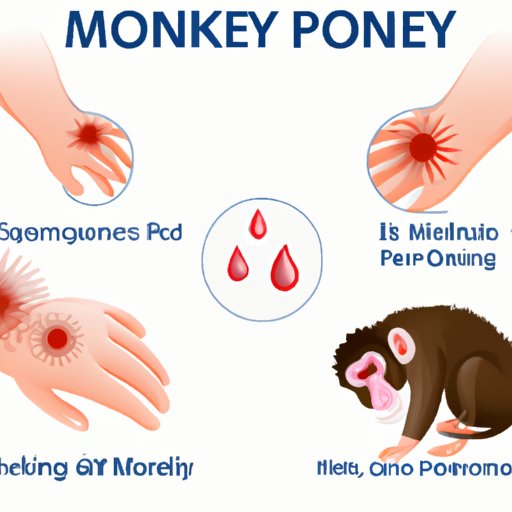
I. Introduction
Monkeypox is a rare disease that can affect humans. It is caused by a virus similar to the one that causes smallpox. While the disease is rare, it can still be deadly, and it’s vital to know the symptoms, causes, and treatment options. The purpose of this article is to provide readers with an understanding of monkeypox and how to effectively treat and prevent it. We will explore natural remedies, the dos and don’ts of preventing outbreaks, the role of vaccinations, and share a patient’s guide to coping with the condition.
II. Understanding Monkeypox: Symptoms, Causes, and Treatment Options
Monkeypox was first discovered in 1958 when researchers found it in monkeys kept for research purposes. Since then, it has been found in other animals, including humans. The symptoms of monkeypox are similar to those of smallpox, including fever, headache, muscle aches, and a rash that develops into blisters. Unlike smallpox, monkeypox cases are usually milder, and fatalities are rare. The disease is spread when a person comes into close contact with an infected animal or person.
There is currently no specific treatment for monkeypox, but there are several treatment options available that can relieve symptoms. These include antiviral drugs, antibiotics, and pain medications. Good hydration and rest are also crucial for recovery. Compared to other similar diseases like chickenpox or smallpox, monkeypox is less contagious and less severe.
III. Natural Remedies to Treat Monkeypox: Effective Home Treatments
Along with traditional treatments, there are several natural remedies that can help alleviate the signs and symptoms of monkeypox. These include taking cool baths or using compresses to reduce fever, applying calamine lotion to alleviate itching, and using oatmeal baths to moisturize the skin. It’s essential to follow the recommendations of healthcare professionals and use these treatments alongside conventional medicines. Pregnant or breastfeeding women and young children should always consult a healthcare professional before using these remedies.
IV. The Dos and Don’ts: How to Prevent and Control Monkeypox Outbreaks
Preventing the spread of monkeypox is crucial, particularly for those who are at a higher risk of infection. The Centers for Disease Control and Prevention (CDC) recommend that individuals avoid contact with sick animals, particularly primates. If a family member or loved one is sick with monkeypox, avoid direct contact with them, and their bedding, clothing, towels, and other items. Perform good hand hygiene and avoid sharing food or drinks.
If someone has been exposed to monkeypox, they may be put in quarantine to prevent the spread of the disease. Based on the situation, the quarantine can vary from self-isolation at home to involuntary hospitalization. Additionally, individuals who have not been vaccinated against monkeypox should contact their healthcare professional immediately to discuss vaccination options.
V. The Role of Vaccinations in Monkeypox Prevention and Treatment
Vaccination is a vital tool to prevent the spread of monkeypox. Currently, there are two available vaccines, including the smallpox vaccine and the Modified Vaccinia Ankara virus (MVA) vaccine. Both vaccines have been shown to be effective in preventing severe monkeypox infections and lessen the risk of death. However, the smallpox vaccine is associated with a higher risk of side effects, particularly for individuals with weakened immune systems. The MVA vaccine carries fewer risks, but there is less information about it. It’s essential to consult a healthcare professional to determine which vaccination is suitable for you.
VI. Case Study: Surviving Monkeypox – A Patient’s Guide to Coping and Recovery
Understanding how to manage monkeypox when infected is critical to recovery. A patient guide to coping and recovery can provide tips for managing symptoms, taking medications, and other essential aspects of managing the disease. The guide can also help prepare families and caregivers to manage the patient’s needs.
VII. Conclusion
In conclusion, while monkeypox is a rare disease, it can be deadly, and it’s crucial to learn how to treat and prevent it. This article has provided an overview of monkeypox, natural remedies, how to prevent outbreaks, the role of vaccinations, and a patient’s guide to coping and recovery. It’s essential to talk to a healthcare professional about the best options for preventing, treating, and managing monkeypox. Starting preventive measures early is critical and can save lives.




